Sherlock Holmes and the Shakespeare Globe Murders Read online
Sherlock Holmes
and the Shakespeare Globe Murders
Barry Day
MYSTERIOUSPRESS.COM
For
Basil, Nigel … and Charles
Chapter One
When I entered the sitting room we had shared for so many years, I found Holmes in an attitude I knew well. He was standing impassively by the window, his head wreathed in the smoke from the noxious shag he insisted on stuffing into his old clay pipe. That early morning pipe was invariably made up of the dottle from the previous day, which he carefully kept and dried on the mantlepiece. I have to say it was not one of his more endearing habits and I tried to time my entrance to avoid it. This morning, unfortunately, I was unsuccessful. He made no move to acknowledge my presence but kept his gaze fixed through the parted blinds on the dull grey London street outside.
Knowing that his failure to return my cheerful “Good morning” was due to his absorption rather than any flaunting of the social niceties, I helped myself to the kidneys and bacon Mrs. Hudson was in the act of laying on the table and settled down with the morning paper.
“It’s good to have you back, Doctor,” said that good soul, bustling around to make sure that I had everything I needed. “There are some people who don’t notice what you do for them, people who don’t let a thing past their lips for days at a time. Perhaps you can talk some sense into him, for I’m sure I’ve given up trying.”
“Oh, you mustn’t worry, Mrs. Hudson,” I said, “shouldn’t be surprised if forgetfulness isn’t part of the male condition. My wife says I’m just as bad …” I had remarried not too long ago and Mrs. Hudson had been prominent among the well wishers.
“And how is your good lady?”
“Very well indeed, thank you, Mrs. Hudson. Which is more than can be said for her poor old aunt up in Harrogate she’s visiting at the moment. I must admit I’d resigned myself to a week or two of boring bachelordom until Holmes’s telegram arrived yesterday. The fellow must have second sight. I’d only just waved her off in the cab …”
“Had I not had the pleasure of seeing her with my own eyes, I might well have deduced that the present Mrs. Watson was a figment of your imagination,” said Holmes, turning from the window. “How often has the absence of your better half been the cue for one of our little adventures?”
It was one of my friend’s rare attempts at levity and, as such, I welcomed it. It was a pleasing contrast with the Holmes I had encountered on my arrival the previous evening, sitting hunched in his favourite chair by the fire, plucking moodily at his violin.
“Good of you to come, Watson,” he said, scarcely appearing to look up. “I sometimes think you are the one fixed point in a changing universe but I see that even you are not impervious to the stigmata of time and good living.”
As we had not seen one another for some months, I determined to indulge him. “Oh, and what tells you that?” I asked.
“Well, you have clearly surrendered some part of your personal toilet to other hands. I suspect to your maid. Your hat was never so well brushed before but the nap is now brushed left to right, whereas you were in the habit of brushing it right to left. In addition, the hat is relatively new and from Messrs. Pilditch of the Strand. You, I fancy, never strayed from your old establishment in Jermyn Street since your army days. The nervous tapping of your fingers on your knee tells me that you have recently given up smoking—I assume at your wife’s request. And if I’m not mistaken, it’s her good plain cooking we have to thank for the extra three—no, two-and-a-half-pounds you have gained since I saw you last.
“Oh, yes, and you have, of course, been much exercised of late about a matter of national importance. You always chew the right hand side of your moustache when you are under stress and the signs are all too recent to be accidental. I toyed with the idea that it might be the latest news from South Africa that was concerning a military man such as yourself, but on the whole I am inclined to put it down to the rather fragile performance of England’s middle order batting in the fifth test at the Oval a few weeks ago. And by the way, the thin coating of clay adhering to your left instep is of a type peculiar to the Kennington area—a factor which, I must admit, did tip the balance. I should have a word with your wife’s new maid, if I were you.”
“Holmes,” I said, shaking my head ruefully, having stepped into his snare yet again, “you never cease to amaze me. The way you explain it, a four year old child could work it out.”
“In which case, heaven preserve me from four year old children or my simple livelihood will rapidly evaporate.” And realising that he had emerged sufficiently from his mood to jest, he threw back his head and laughed in the hearty, noiseless fashion to which I had grown so accustomed.
For the rest of the evening he was his old self, anxious to hear of my recent re-marriage and the ups and downs of my somewhat casual practice. Then, just before we said goodnight, his mood changed again and the brooding look returned. “I owe you an apology, old fellow,” he said, “for dragging you here under false pretenses. There is, I regret to say, no bizarre or arcane problem in which I need your valuable assistance. That is the problem in a nutshell.”
“Oh, there are cases, to be sure, but none that keeps boredom at bay for more than a moment or two.” He named one or two that I remembered reading about in the papers in recent weeks. “Insults to the intelligence, Watson, insults to the intelligence and do you know something? I may be becoming paranoid but I swear people are beginning to copy our cases for their crimes. You recall the affair of the Blue Carbuncle, where the thief hid the purloined jewel in the crop of a Christmas goose? Well, where do you think the Duchess of Albermarle’s pendant came to light? Stuffed, rather inelegantly, into the turkey. The butler did it, of course.”
“Life is fast becoming uninterrupted déjà vu, Watson. You know my life has been one long battle with boredom, which you have time and again helped me keep at bay. Yet, I can feel ennui reaching out its withered fingers to embrace me. I have even been driven to considering the pipe of late …”
Seeing my start of surprise, he laughed again briefly. “Oh, don’t worry old fellow, I left the seven per cent solution behind me many a year ago. As you yourself pointed out many a time, it was no solution. I mention it merely to indicate the depths of my boredom.”
“No, I must confess I lured you here entirely for the pleasure of your company, knowing that you were temporarily at liberty. I thought we might do some long-avoided cross-indexing for want of anything more diverting. And, frankly, I had the rather superstitious hope that your presence within the old quarters might re-create the chemistry for crime.” And here he gestured at the maze of Bunsen burners and retorts that were his world when all else failed.
Soon after we turned in and this morning I was pleased to see he seemed more like the Holmes I knew. The glint was back in the eye and his movements were energetic rather than restless.
“Well, Watson,” he said, spearing the last piece of bacon that I had mentally consigned to my own plate, “if you’ve quite finished sustaining the inner man, perhaps Mrs. Hudson will be good enough to clear away the debris. I never think it gives a client the right impression when they’re asked to pour out their problems over congealing crockery.”
“What makes you think you’ll have a client?” I asked, somewhat grumpily. With rare exceptions, Holmes was in the habit of using food as fuel, whereas a well-cooked rasher of bacon never failed to receive due appreciation from me.
“Because I was watching her from the window while you and Mrs. Hudson were cataloguing my shortcomings. And if I’m not mistaken, that will be her at the doo
r now.” Indeed, as if on a cue in a melodrama, there was a hesitant ring at the front door below. Hastily gathering the breakfast things together, Mrs. Hudson hurried off to answer it.
Holmes took up residence in his favourite chair by the fireplace, his fingertips steepled in front of his face and his eyes to the ceiling, his long legs stretched out in front of him.
“An actress without doubt. Not a particularly successful one or else fallen on hard times. American at a guess or, at the very least, she has been out of this country for some time. Oh, and her clothes are not her own. Interesting …”
“Come, Holmes,” I said impatiently, “you know how your little games upset me until I know the answers. Speak up, man—how can you possibly know that?”
“My dear fellow, it’s rather hard to draw any other conclusion when you have watched a woman pace up and down the pavement opposite for fully five minutes, mouthing to herself and gesturing, then doing the same thing with different gestures. That is the behaviour either of a lunatic or of an actress learning her lines. And I have felt that there have been occasions in the theatre lately when there was little to choose between the two! Then, when she did decide she was ready to make her entrance, she looked at the traffic the wrong way—a habit which bespeaks someone who has spent time on the continent of Europe or, more probably, in the land of our lost colonies …”
“And the clothes?”
“It has been my observation over the years that ladies who wish to consult me invariably take great pains with what they wear. They appear to be under the illusion that fine clothes will compensate for what is all too often a thin story. They feel more confident when they know they look their best, yet this lady kept tugging at her clothes, from which I deduce that, either she is not used to wearing finery or that they are not her own. Ah, here she is now …”
“Miss Adler to see you, Mr. Holmes.” Mrs. Hudson had been about to say more but was clearly taken aback—as I was—by Holmes’s reaction. Our visitor’s arrival had found him rising to his feet but the announcement of her name froze him into position for a moment, like a large bird poised for flight. I knew immediately what was going though his mind.
Could this tall woman standing in our doorway, dressed from head to foot in black, her face covered with a thick veil, possibly be Irene Adler—the woman, the only woman ever to defeat Sherlock Holmes, as she had in the affair of a Scandal in Bohemia some years earlier?
Second later the question was resolved. Moving across the room towards him, precisely like an actress making her stage entrance, the lady offered Holmes the fingertips of her gloved hand.
“Mr. Holmes, I presume? My name is Flora Adler, daughter of Florenz Adler, the theatrical impresario. You may know of him?”
Holmes bowed and nodded, his composure completely regained. Never having met him before, it was quite probable that Miss Adler had not detected the signs that were obvious to Mrs. Hudson and myself. Holmes himself was no mean actor. In fact, I have often reflected on what the stage lost when he devoted himself to the theatre of crime. As he showed her to the visitor’s chair, I consigned the coincidence to the back of my mind but, as I reflect on it now, I wonder whether that momentary shock did not somewhat dull my friend’s razor sharp senses at the outset of what turned out to be one of the more complex cases he was ever to engage in?
“Indeed, Miss Adler, who has not heard of the great showman who staged Wagner’s Ring in the Grand Canyon, transformed Times Square into a temporary circus—though I’m told many people found your father’s animals infinitely preferable to its normal denizens—and organised a chariot race around Central Park? Not to mention introducing America to European opera and ballet almost single-handed. And now I hear he has crossed the Atlantic to colonise us?”
At that moment some pieces fell into place for me, too. I snatched up the morning paper and riffled through it until I found the story I’d been reading when Holmes interrupted my morning ritual. “Ah, here it is,” I interrupted. “Adler. Isn’t he the fellow who’s rebuilding some Elizabethan theatre down on the river?”
“Not some Elizabethan theatre, Watson—the Elizabethan theatre. Shakespeare’s own playhouse—the Globe—and within a few yards of where the scholars seem for once to agree the original must have stood. If I’m not mistaken, Miss Adler, your father proposes to open it very shortly and in the presence of Her Majesty the Queen?”
“That’s right, Mr. Holmes,” she replied and then to our considerable surprise from behind her impenetrable veil came the sound of loud sobbing. I immediately leaned forward to offer her my bandana but she held up her hand in a gesture of refusal and rummaged in her purse until she found a delicate cambric handkerchief, which she raised to her eyes, still without lifting her veil.
Holmes, always adept at allowing his lady clients to regain their composure, continued. “But surely, Miss Adler, this should be an occasion for rejoicing not tears? That your father should be so close to achieving something which many men have dreamed of for the past three hundred years must be the crowning success of even his—shall I say exceedingly ‘dramatic’ career. That it took an American to restore to the world the platform its greatest writer peopled with Hamlet, Othello, King Lear, Julius Caesar and so many others is, I freely confess, something which should make an Englishman feel somewhat inadequate. But that temporary embarrassment should take nothing away from what your father is on the brink of giving to us all.”
I turned again to the paper. “And it says the opening performance is only a few days away.” Here I read aloud from the report:
“The theatre is already fully booked for the gala occasion. Some one thousand, five hundred people will pack themselves into the three covered galleries or stand around the stage as ‘groundlings’, just as their Elizabethan forebears used to do.
American impresario, Florenz Adler, however, has managed to achieve something the original Globe could not boast. At the opening, September 21st, 1899 the performance will be graced by the presence of HM Queen Victoria, whereas Queen Elizabeth—keen supporter of the players though she was—is thought never to have visited the playhouse, preferring to summon them to perform at Court.”
“Quite an honour, eh, Holmes?”
“Yes, but that’s just it,” Miss Adler cried, sounding, if anything, even more distressed. Then, with a supreme effort, she managed to calm herself. “I’m sorry, gentlemen. I’m sure I don’t seem to be making too much sense. It’s just that I’m so worried about my father.”
Holmes sat back in his chair, giving off that air of calm I have known to relax the most agitated of visitors. “Miss Adler,” he said in a low tone, “Dr Watson and I are at your service. Please proceed with your story. Are you sure you will not remove your veil? As you wish.”
“Well, Mr. Holmes, I’ll try and tell it as simply as I can but I fear there are terrible forces at work. A man like my father, as I’m sure you can imagine, does not rise in his profession without making enemies. Nor is he an easy man by temperament. He does not suffer fools and I’m afraid his definition of ‘fool’ is a broad one. He has always been fiercely competitive and many of his rivals have been left along the way. Over the years there have been threats, abusive correspondence …”
“And what has been your father’s reaction?” asked Holmes.
“Oh, he’d just laugh and tear them up and say something like—‘People who can’t stand the heat should get out of the kitchen!’”
“A curious language,” Holmes murmured, almost under his voice. “Pray continue.”
“There seems to be something about this project that’s bringing things to a head. He knew when he started that a lot of people would be jealous and so it’s proved. There have been articles in the newspapers. What right has an American to tamper with our national heritage? That sort of thing. You must have seen them, Mr. Holmes?”
My friend inclined his head, unwilling to interrupt her flow.
“But it’s the strange letters …”
“What is so strange about these as opposed to the other letters, Miss Adler? I beg you to think carefully.” Holmes was now all attention, leaning forward in his chair, his fingers laced.
“Well, they’re not exactly letters. Just typewritten notes with quotations on them and unsigned. Oh, and they all have a drawing of a rose at the bottom of them.”
“Do you have any of these notes?” Holmes asked, stretching out a hand.
“My father threw them away. He said he wasn’t going to waste his time dealing with a crackpot But I did manage to retrieve the most recent, which only arrived this morning.” At this Miss Adler began to fumble awkwardly with her purse and finally produced a folded scrap of white paper, which she handed to Holmes. He then proceeded with the ritual I had seen a thousand times, holding it up to the light, feeling the texture, even smelling it before he unfolded and read it.
While he did so, the silence in the room was palpable. “What do you make of it, Holmes?” I said finally, more as a means of breaking it than with any real expectation of an explanation.
“I doubt that we are meant to make much of it,” he replied, handing me the document. “Typed on paper that can be bought in any stationer’s by someone who is left handed and unaccustomed to using a typewriter. You can see by the way he—or she”—and here he looked at Miss Adler—“puts more pressure on the letters ‘e,’ ‘a,’ ‘r,’ ‘s,’ and ‘t’ which occur on the left hand side of the key board. No, the ‘style’ is as clear as that of a concert pianist performing a particular piece. I have written a short monograph on ‘Crime and the Language of Typewriters’ since I saw you last, Watson. There are, in fact, a dozen other aspects to be observed but that will suffice.”
I looked at the note properly for the first time and took in its content. There typed in the middle of the page was the quotation Miss Adler had spoken of …
FIRST I BEGAN IN PRIVATE WITH YOU, MY LORD OF LINCOLN

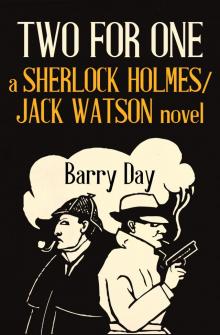 Two for One
Two for One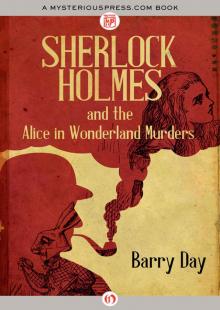 Sherlock Holmes and the Alice in Wonderland Murders
Sherlock Holmes and the Alice in Wonderland Murders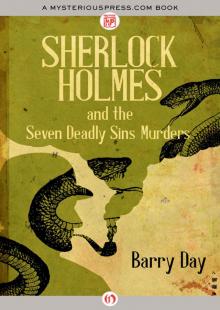 Sherlock Holmes and the Seven Deadly Sins Murders
Sherlock Holmes and the Seven Deadly Sins Murders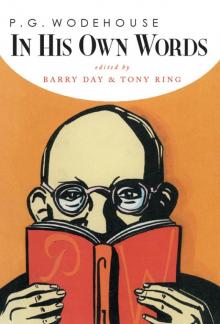 P.G. Wodehouse in his Own Words
P.G. Wodehouse in his Own Words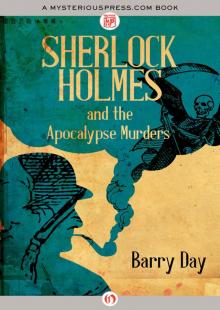 Sherlock Holmes and the Apocalypse Murders
Sherlock Holmes and the Apocalypse Murders Sherlock Holmes and the Shakespeare Globe Murders
Sherlock Holmes and the Shakespeare Globe Murders